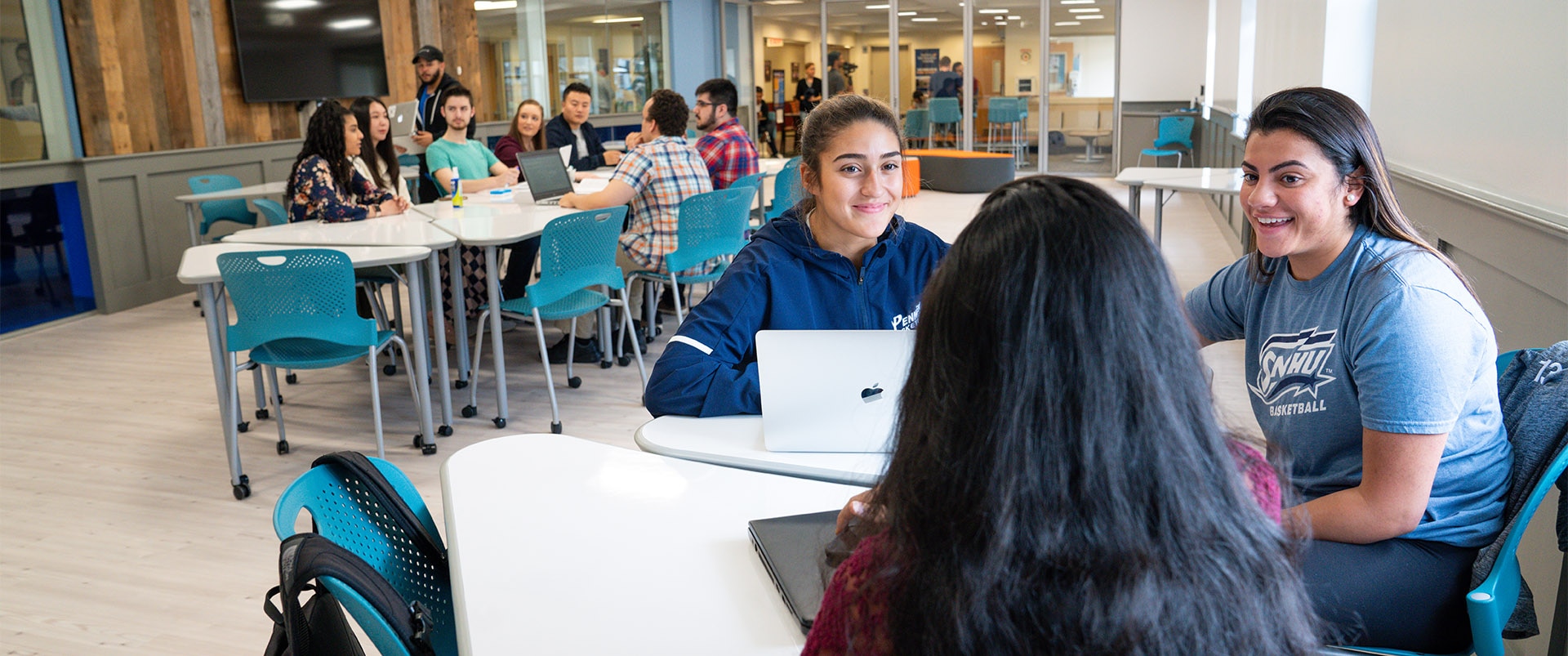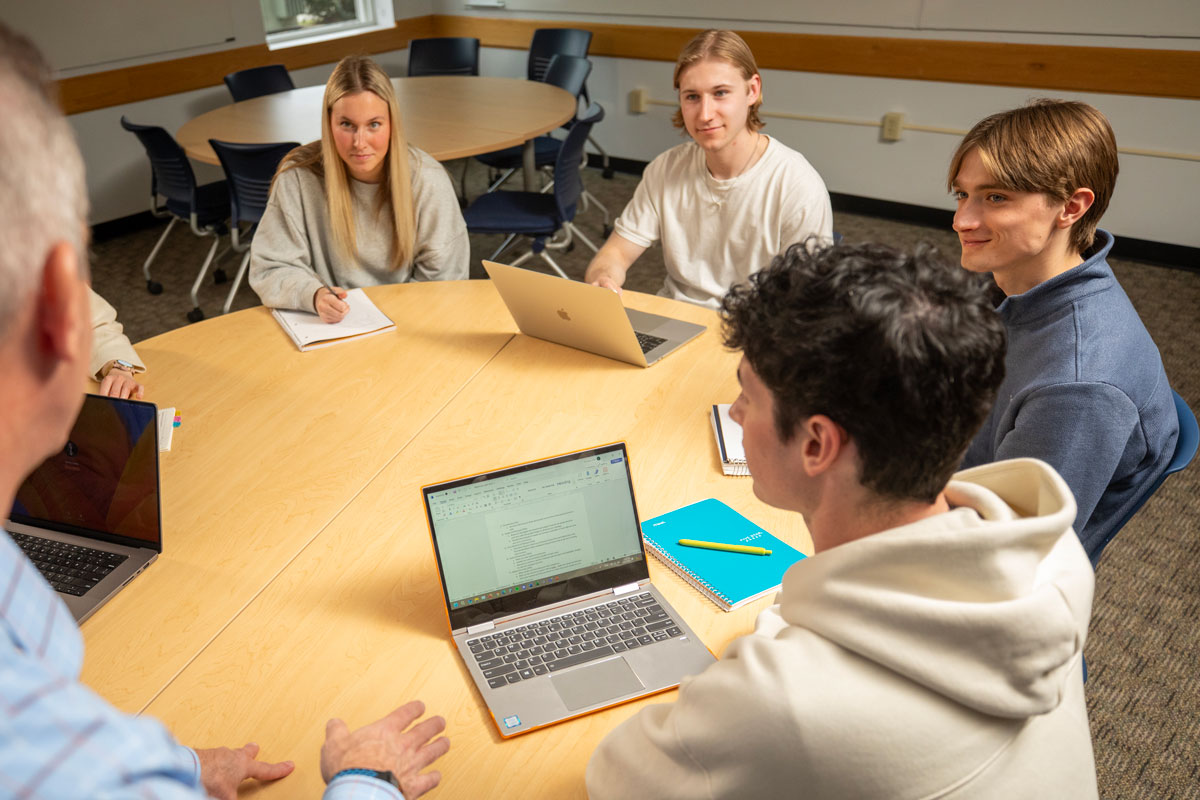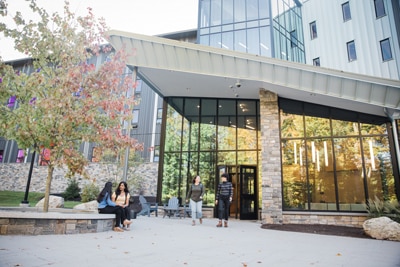Bachelor of Arts in Sociology New England campus experience

Program Overview Why get a sociology degree on campus?
Please note that the Bachelor of Arts (BA) in Sociology program will no longer be accepting new student enrollments after the Spring 2026 semester. Students seeking a related field of study are encouraged to explore our Bachelor of Arts (BA) in Law, Politics, and Societies program.
Are you fascinated by human behavior, social groups and society in general? With the Bachelor of Arts (BA) in Sociology from Southern New Hampshire University, you can study all of that and more.
Here, you'll analyze how groups form and function as communities and how social habits evolve and influence community development. You'll also explore society's historical, economic and political issues, learn to solve real-world problems through hands-on assignments and gain the skill set needed to advocate for change.
Skills you'll learn:
- Sociological theory
- Group behavior and social patterns
- Research methods and assessment
- Current social issues
- Impact of social constructs, such as gender, race and nationality
- Social construction of realities evaluation

Courses & Curriculum Dive into cultures with on-campus sociology courses
Our sociology classes give you the opportunity for first-person experience in analyzing and dealing with processes, problems and institutions of modern society. With a mix of classroom and experiential learning opportunities - and the flexibility to explore electives and internships - you'll be able to make the most out of your SNHU experience. Plus, with small class sizes of just 15-20 students, you'll be able to make connections with faculty members and your peers as you develop research skills and projects while exploring facets of society.
Interested in learning in an online environment? This same curriculum is offered through SNHU's online sociology degree.
Learn from instructors with industry experience
Our faculty members bring with them decades of knowledge and experience in sociology, which informs the development of SNHU's courses and curriculum. They look forward to supporting your journey in the classroom and as you work toward a career in your field.
Christine McClure
Position
Professor
Joined SNHU
2016
Education
- MA in Applied Sociology from the University of Central Florida
- BS in Behavioral Sciences from the University of New Hampshire
Christine McClure has over 20 years of experience in leadership roles, including supervision, administrative, mentoring, teaching and advising. She is an experienced educator with a background in organizational behavior, groups, management and public speaking. Previously, she taught at Lakes Region Community College, Reykjavik University in Iceland and Cape Cod Community College. Her background includes roles in institutional research and assessment, academic policy and standards, strategic planning initiatives, program evaluation and cost-benefit analysis.
To learn more about SNHU faculty, visit our campus faculty page.
Campus major courses
You’ll take major courses that provide you with a solid foundation in your area of study – in some cases featuring experiential or project-based learning opportunities, labs, simulations and internships. These courses will allow you to learn a wide variety of topics and help prepare you for a role in your desired field.
Courses may include:
Visit the course catalog to view the full BA in Sociology curriculum.
Campus general education courses
All undergraduate students are required to take general education courses, which are part of SNHU's newly redesigned program, The Commons. The goal of The Commons' curriculum is to empower you with some of the most in-demand skills, so you can succeed not only in your academic career, but in your personal and professional life too.
Courses may include:
Can’t wait? You don’t have to!
Apply now if you’re ready, and have your decision within 30 days. Or, schedule a visit and come see us in person!
Have questions? Visit our Contact Us page.
Career Outlook What can I do with a sociology degree?
In the field of sociology, there are many ways to make a difference. While jobs with the title "sociologist" are typically reserved for those with graduate degrees, our bachelor's program could position you for employment in social advocacy, community health or politics. Or you might explore working in a field that uses the data gathering, analysis and research skills you gain, such as communications, human resources, management, marketing, public relations, public safety and even urban planning. Earning your bachelor's in sociology can also prepare you to continue your education in a graduate program. At SNHU, you can pursue your master's degree in any of our dozens of programs, including subjects like psychology, criminal justice and public health.
Career paths include:
- Learning and development specialist
- HR coordinator
- Community health worker
- Social and community service manager
- Health policy lobbyist
- Consumer advocate
Increase in roles for social and community service managers through 2033, projected by the U.S. Bureau of Labor Statistics (BLS).1
Median annual pay nationally for social and community service managers as of May 2023, according to the BLS.1 Statistic not based on wage data for SNHU graduates.
Understanding the numbers
When reviewing job growth and salary information, it’s important to remember that actual numbers can vary due to many different factors—like years of experience in the role, industry of employment, geographic location, worker skill and economic conditions. Cited projections are based on Bureau of Labor Statistics data, not on SNHU graduate outcomes, and do not guarantee actual salary or job growth.

Campus Student Experience So, what's it like taking classes on campus?
In your sociology classes at SNHU, you can get firsthand experience analyzing and dealing with processes, problems and institutions in modern society through experiential learning. You'll examine real-life problems and scenarios to determine the underlying causes. With our partnerships across the community, you can even explore opportunities to work with at-risk populations at the Chandler Center for Service Learning and provide support to programs like the YWCA Center for New Americans. Outside the classroom, you can build your career skills through internships at K-12 schools, children's homes, elder-care facilities and international refugee sites.

Student support
At SNHU, you don’t have to do this college thing alone. You’ll have help from your advisor, access to tutoring and office hours, career coaching, and mental health services so you can do your best and feel your best.
Additionally, our Office of Diversity and Campus Accessibility Center make campus a safe place for everyone. Visit our Student Services page to learn more about our support offerings.

Small class sizes
With an average class size of 15-25 (depending on your major) you’ll learn in an environment where professors with real world experience know you by name.
Here, you’re not getting lost in giant lecture halls, but instead, actively participating in thoughtful dialogue where you’re always encouraged to collaborate with your peers and ask questions when they arise.

State-of-the-art facilities
Our 300-acre campus has everything you need. From technology-advanced classroom settings to your dorms complete with fitness centers and hangout spots, our goal is to give you the best college experience possible.
Whether you’re learning in a classroom, in a lab, on the field, or in your field, you’ll have what you need to be successful from the moment you wake up to the moment you close your textbooks.
School of Arts, Sciences and Education Learn about the School of Arts, Sciences and Education
From understanding why people behave the way they do, to studying and tackling today's environmental issues, the School of Arts, Sciences and Education serves as an academic hub for creativity, collaboration and learning. Here, you'll have the chance to gain real-world experience through internships, student teaching, lab work and community-based projects. From studying cells under a microscope or analyzing crime scenes to leading a student-teaching session in an elementary classroom, you’ll learn how the world works so you can help make it a better place.
Student teaching opportunities
Inkwell game design studio
State-of-the-art labs
How SNHU makes college affordable
At Southern New Hampshire University, we're on a mission to make high-quality education more accessible with more affordable tuition. With 70+ career-focused majors, state-of-the-art facilities, D2 sports and over 70 student clubs and organizations, you can get the campus experience you've always dreamed of at a more affordable price.
Fill out the FAFSA to see if you’re eligible for grants or work-study. (You could also be offered loans, though you’ll have to pay those back later.)
Transfer up to 90 credits toward your bachelor's degree program at SNHU. If you’ve taken one course or many, we’ll evaluate them for you.
Getting free money for college – from SNHU or an outside organization – could help you save hundreds or even thousands of dollars.
Our collaborative partnerships with high schools enhance academic opportunities and college accessibility for some high school students.
Accreditations
SNHU is accredited by the regional accreditor the New England Commission of Higher Education (NECHE). The university also carries specialized accreditations for some programs.

Sources & Citations
1Bureau of Labor Statistics, U.S. Department of Labor, Occupational Outlook Handbook, on the internet, at:
https://www.bls.gov/ooh/management/social-and-community-service-managers.htm (viewed Oct. 10, 2024).
Cited projections may not reflect local or short-term economic or job conditions and do not guarantee actual job growth.
Your dream school is waiting
Apply now or schedule a visit today.


